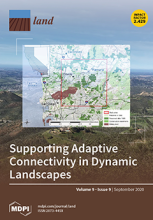/ library resources
Showing items 1 through 9 of 323.The complexity of spatial use has an impact on poverty and the development of slum settlements towards a decrease in environmental quality.
Beginning during the colonial period, and greatly accelerating following independence in 1965, Singapore has used land reclamation to increase its national domain by nearly 25 per cent.
Sustainable land management is essential to meeting the global challenge of securing soil and water resources that can support an ever increasing population.
Cities often don’t appreciate the benefits of green infrastructure (GI) enough.
Nature-based solutions (NBS) is the latest contribution to the green concept family. NBS is defined as actions based in nature addressing societal challenges.
The environmental consequences of the decision to urbanise and displace peri-urban (PU) food production are not typically evaluated within a comprehensive, cross-sectoral approach.
The concept of a nature-based solution (NBS) has been developed in order to operationalize an ecosystem services approach within spatial planning policies and practices, to fully integrate the ecological dimension, and, at the same time, to address current societal challenges in cities.
Climate change affects poor and marginalized communities first and hardest.
As Vietnam embraces the market economy, and a number of state policies promote reforestation and rural market integration, land use and land cover (LULC) changes are occurring in the country’s northern uplands in increasingly complex and fragmented ways.
Paginação
Land Library Search
Through our robust search engine, you can search for any item of the over 73,000 highly curated resources in the Land Library.
If you would like to find an overview of what is possible, feel free to peruse the Search Guide.






